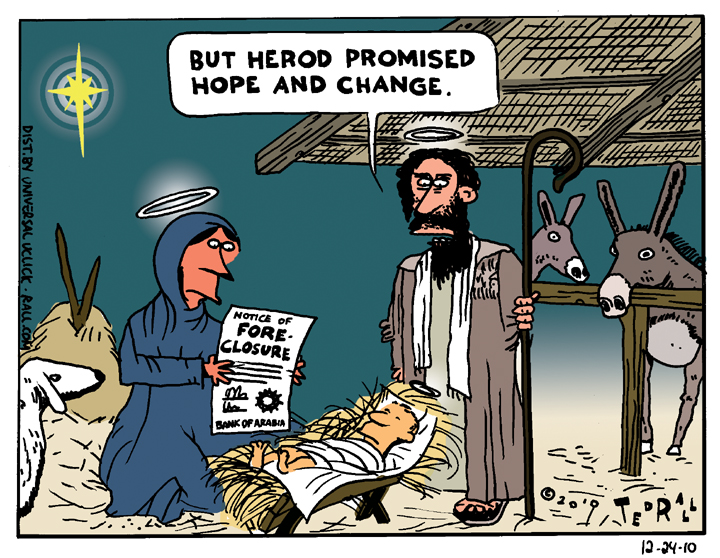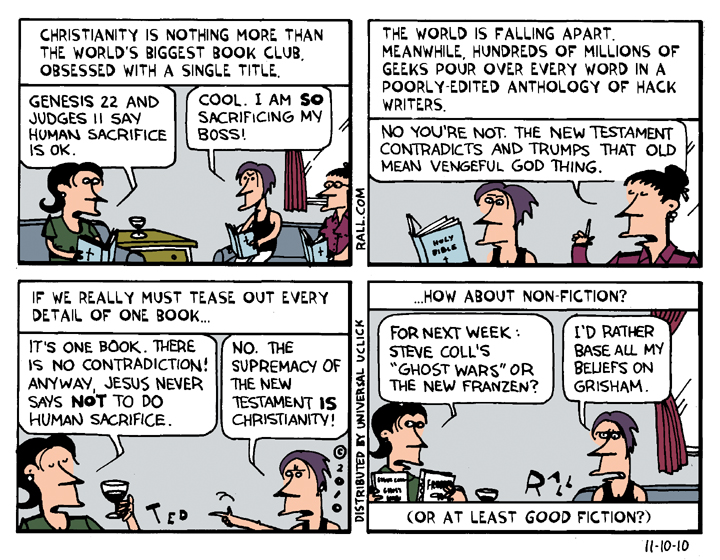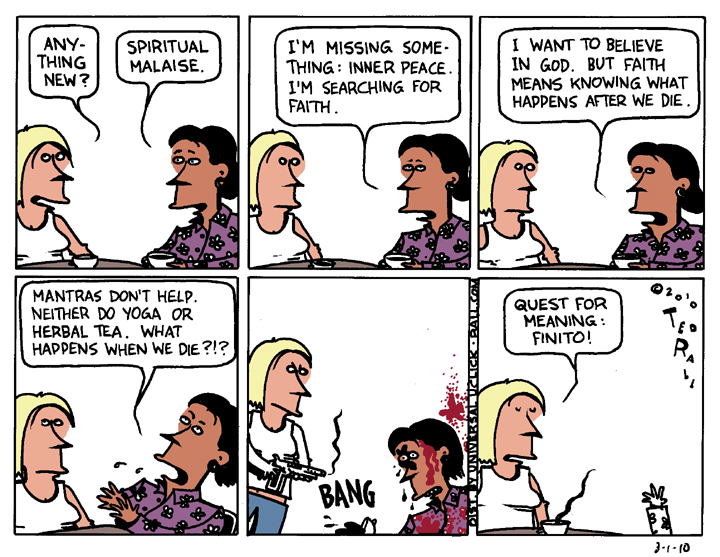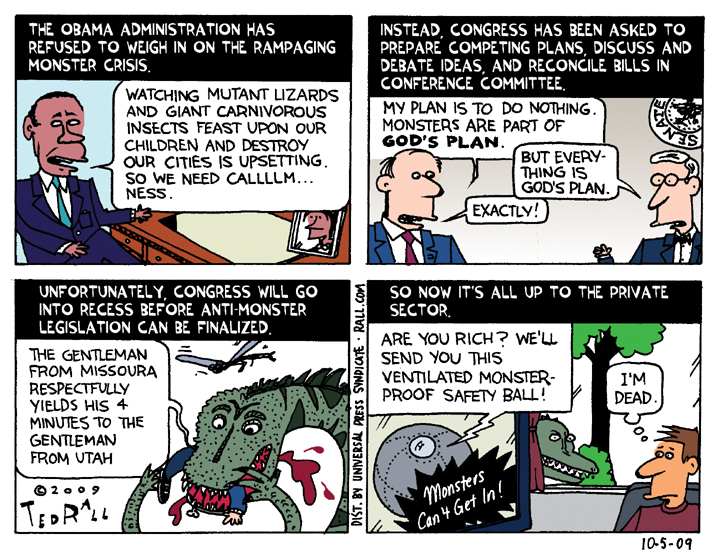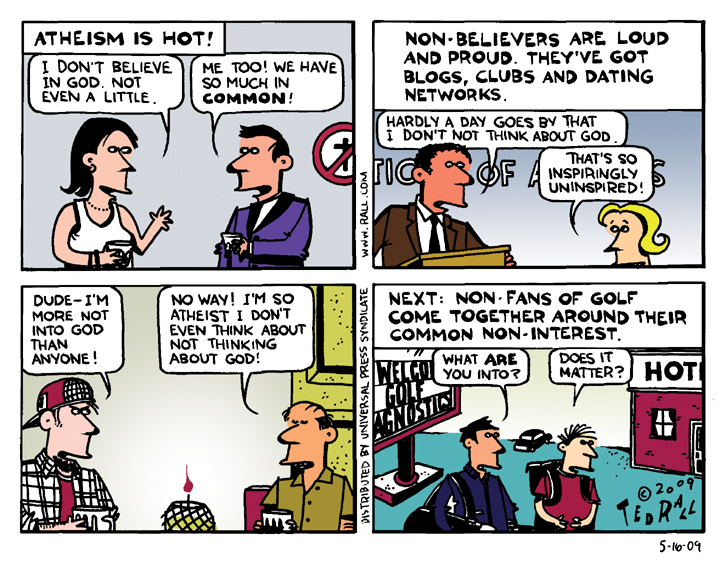On Christmas Eve, a certain family wonders whatever happened to promises for hope and change.
SYNDICATED COLUMN: The War of Christmas
Time to Take Religion Out of the Calendar
We are a secular nation. We enjoy the constitutional right to exercise any religion—or none whatsoever. So why is Christmas a federal holiday?
The U.S. has no national religion. Yet Christians get special consideration. Aside from Christmas, they also get the quasi-Christian holiday of Thanksgiving. Financial markets are closed on both of those, plus Good Friday.
Devotees of other faiths must ask their employers for time off. Jews aren’t supposed to work on Rosh Hashanah, Yom Kippur, the first and second days of Sukkot, Shemini Atzeret, Simchat Torah, Shavu’ot, or the first, second, seventh and eighth days of Passover. They have to take up to 13 days off from work each year, more than most employers offer.
The message to Jews and other non-Christians is plain: you are second-class citizens. Separation of church and state is a fraud. You wanna practice your faith? Do it on your own time.
You might think that the government’s official embrace of Christmas is a cultural relic of America’s puritan past. But you’d be mistaken. For nearly 100 years, Christmas was not on the calendar of federal holidays. On December 25, 1789, the first Christmas under the new U.S. constitution, Congress was in session. Ulysses Grant made it a federal holiday in 1870.
At first (and second and third) glance, the Christmas federal holiday seems like a clear violation of the Establishment Clause of the U.S. Constitution. In 1999, however, a federal district court judge in Ohio rejected a lawsuit challenging the special status of Christmas. The court ruled that “the establishment of Christmas Day as a legal public holiday does…not have the effect of endorsing religion in general or Christianity in particular.”
Legal reasoning gave way to the simplest calculus: we do stuff because we can.
Right-wing commentators such as Bill O’Reilly have accused liberals of waging a “war on Christmas.” Actually, there’s a war of Christmas: Christians use the holiday as a bludgeon against the rest of us. (Sort of how the “war on terrorism” is really a “war of terror.”) Christmas’ designation as a federal holiday is the most brazen and thus most offensive manifestation of Christian hegemony in America.
The Christian Right’s “war on Christmas” meme would be laughable if it didn’t work; they’re the majority, they’re in charge, but somehow they’re victims. The smallest concession to common decency and sensitivity—e.g. not displaying nativity scenes on government property—is portrayed as an attack on innocent Christians. Not subtle. But clever: the dominant majority gets to claim victimhood. Anything short than total domination isn’t good enough.
This has nothing to do with suppressing Christianity. I am touched, not offended, when a person of faith says that he or she is praying for me, or wishes me a “Merry Christmas.” Individual and/or private displays of religiosity are fine.
Official expressions of a specific religion, however, are disgusting and inherently repressive. Public-school teachers should not wish their students a Merry Christmas. Presidents should not end speeches by saying “God Bless America.” Our currency should not read “In God We Trust.” Courts should not use Bibles to swear in witnesses. Government officials and employees who wear their Christianity on their sleeves reinforce the majority and subjugate the minority. Notice, it’s always Christians. When’s the last time a TSA screener wished you a blessed Ramadan?
A country should live up to its stated principles. Everyone who wants to honor Christmas, whether in its religious or its consumerist contexts, is free to do so. Go to midnight mass. Festoon your roof with plastic Santas. But the government shouldn’t make it easier on Christians to celebrate one of their religious holidays than it does members of other faiths.
There are only two fair courses of action:
First, remove Christmas from the list of federal holidays. But replace it with something secular! Preferably in March or April. There’s a long gap there.
Alternatively, add holidays for other religions. Of course, this could get complicated. How many holidays for each religion? Some faiths are more festive than others. How far down the list of major American religions do we go? The Zoroastrian holiday of Navruz? Shall we make room for new religions like Scientology?
After every sect gets its day in court there might not be a single day left in the year to work.
I say: the more days off, the merrier. Er, better.
(Ted Rall is the author of “The Anti-American Manifesto.” His website is tedrall.com.)
COPYRIGHT 2010 TED RALL
Join the Atheist Movement
This was inspired by a New York Times article about how atheism is catching on. Funny, for me it’s not like that. I’m not against religion (although, objectively, it is a terrible distraction from efforts needed to solve real problems and often becomes a conduit for hatred)…I just don’t think about it. The idea of getting together with other people who don’t believe in God makes me laugh.
SYNDICATED COLUMN: A Divine Strategy
Ancient Deities Adapt to a Brave New World
Until recently, God it had it all—omnipotence, ubiquity and benevolence. As the leading beneficiary of the current global trend towards monotheism, the guy who made everything and ran it all didn’t have to do much to attract popular support. Then, in 1993, God’s pollsters came to him with some bad news: his numbers were slipping.
“I was down to 43 points, and falling fast,” God recalled at a recent interview. “In New Jersey it was like they’d never even heard of me. I had to do something fast.”
Polls revealed that many people felt that God was out of touch with their concerns. “I prayed for my boss to be slowly gummed to death by sea cucumbers,” said one respondent, “but he’s still here, counting how long I take to go to the restroom. So much for the power of prayer.” Furthermore, God’s existence had in the past been justified by the existence of causality, design and purpose in the universe—an assumption that recent advances in chaos theory have rendered obsolete.
Advisors to the central deity of Christianity, Judaism, Islam and those other faiths told him that the only way to recover was to take a page from his chief opponent’s book. “You can move towards evil without actually becoming evil,” his head speechwriter said. Within days, God announced his transformation to a “New God.”
At the time, many religious observers were skeptical that a deity could abandon over 5,000 years of straightforward love for mankind in favor of a more pragmatic approach that asked people to be responsible for themselves. Now, three years later, it’s clear that God has adapted with incredible ease to his new image.
First he decided to give up positions that many had seen as overly judgmental. “Take sin,” he explained during one of his weekly radio addresses. “Who’s to say what’s sinful and what’s not? Sure, a murderer who carves up his best friend with a butcher knife might seem bad. But the guy must have had his reasons, right?”
But strategists also determined that others considered God to be too soft on mankind in general. Many missed the 17th century Calvinist view of humanity as a loathsome spider dangling from a tiny thread above a flame, averting disaster by the Almighty’s whim. To address this nostalgic yearning for a fiercer, more vengeful Supreme Being, God caused an increased number of airplane crashes, bursting dams and a variety of new diseases—all in order to make the interplay between behavior and destiny appear more fickle.
In addition, God has finally managed to shed the “M” word—merciful. “I’m tired of being tarred with the brush of being called ‘kind and merciful,’” God recently told a group of Rotarians. “Mercy implies wimpiness. And the other side doesn’t have a monopoly on fire and brimstone.” Since late 1994 he has ignored 85 percent of prayers from the poor and sick. He has also smitten a half-dozen cities entirely without provocation.
To be sure, devout worshipers of God—his traditional core base—are not pleased with the New God. Some suspect that the new image resulted more from budgetary than ideological considerations; concern for mankind was much easier thousands of years ago when there were only a few million people.
Reached at her hospice in Calcutta, Mother Teresa asked: “What’s the point of obeying God if he acts more and more like the devil? At that rate you might as well go for the real thing.” Still, the world’s most famous nun emphasized, she was sticking with God for the time being.
Others, fearing divine retribution, spoke only on condition of anonymity. In Tehran, a leading imam said: “Look, we all understand that it’s a new world out there. So maybe we pray twice instead of four times a day, okay, I can see that. But he’s been advertising for souls on the World Wide Web!”
Indeed, Satan is bitter about the New God, claiming that God has taken over many issues that were once the Dark One’s own. “In the old days, good was good and evil was evil. You didn’t need a program to tell the players. But now it’s all mixed up! Everyone’s moving to the center, but by giving up our core identities I fear that we’re all losing our souls.”
Satan, too, has attempted to broaden his base by appealing to people who were traditionally considered good, by curing certain obscure venereal diseases and opening a soup kitchen in Mexico City. He has even reached out to the MTV generation with bumper stickers reading “Beelzebub is cool,” but the Prince of Darkness still seems unable to overcome the perception that he doesn’t care about the environment.
Meanwhile, God’s remarkable progress, which has earned him the moniker the “Comeback Creator,” continues as his popularity rating leads Lucifer’s by nearly 20 percentage points. As this year’s holiday season looms, even the malcontents seem likely to stick with the “New God.” “Where else can those goody-two-shoes go?” God scoffed recently at a press conference during which he announced the end of morality as we know it. “It’s not like they’re gonna go to the devil.”
(Ted Rall, a syndicated cartoonist and freelance writer based in New York City, has damned his soul to eternal hell.)
© 1996 Ted Rall, All Rights Reserved

